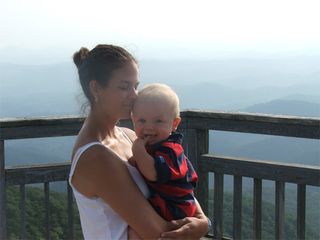Love Makes Kids Smarter

For some odd reason, it takes constant reminders that we primates need nurturing. In a recent study of 46 baby chimpanzee orphans, Kim Bard of the University of Portsmouth in England and her colleagues demonstrated that primate babies that have tight relationships with mother figures do much better on cognitive tests than babies who receive only the basics of food, shelter, and friendship with peers. But this is not breaking news. In fact, it's old news. In the 1950s, Harry Harlow conducted a series of experiments with baby rhesus monkeys that showed, without a doubt, that lack of love and comfort makes for a crazy monkey. Harlow constructed a cage that included a wire monkey "mother" topped with a plastic face. In this wire Mom he inserted a bottle. The cages also held an alternative to the wire mother, the same wire and plastic contraption but covered with terry cloth. The baby monkeys spent all their time clinging to the cloth mother and only went to the wire mother to feed, demonstrating that a soft touch beats something to eat any day. But even more interesting, Harlow's experiments produced really nutty adult monkeys, females who were unable to mother themselves because they had no idea what mother love might be. Further, Harlow and pals put little monkeys into contraptions that isolated them from others, visually, physically, and even out of hearing, and the babies became despondent. The good news was that the researchers were also pretty successful at reversing the psychological damage done to these animals by slowing introducing happy little touchy-feely peer monkeys into their cages as therapists. Harlow's monkey work was important because, at the time, pediatricians, child care "experts," and everybody's grandmother had a "no touch, no comfort" policy toward children. They adamantly advised parents not to respond to crying babies, felt infants should sleep alone to grow up independent, and for God's sake put that kid down. But Harlow's work changed all that. Mothers were soon permitted to have their newborns next to them in the hospital, and these days no one looks askance at a baby in a sling. The current chimp research builds on Harlow's work by showing that mother love doesn't just make for a psychologically well-adjusted child, it also makes for a smart kid. Bard and colleagues evaluated the cognitive abilities of the chimps when they were 12 months old with standard human tests for children of that age, tests that ask little kids to imitate squiggles on paper and pick up a cup to find a rock. The highly nurtured chimps did better than the ones without a history of attachment, and what do you know, the well-nurtured chimps did even better than human kids on this pint-sized IQ test. And so we hear it once again. We are primates, social animals which need attachment and love . We need to be held and talked to and made to feel that at least one person wants to be with us all the time. And if we get that kind of connection, we are bound to be fine, even better than fine.
- Science News About Love
- Top 10 Amazing Things You Didn't Know About Animals
- 5 Ways to Beef Up Your Brain
Meredith F. Small is an anthropologist at Cornell University. She is also the author of "Our Babies, Ourselves; How Biology and Culture Shape the Way We Parent" (link) and "The Culture of Our Discontent; Beyond the Medical Model of Mental Illness" (link).
Sign up for the Live Science daily newsletter now
Get the world’s most fascinating discoveries delivered straight to your inbox.
